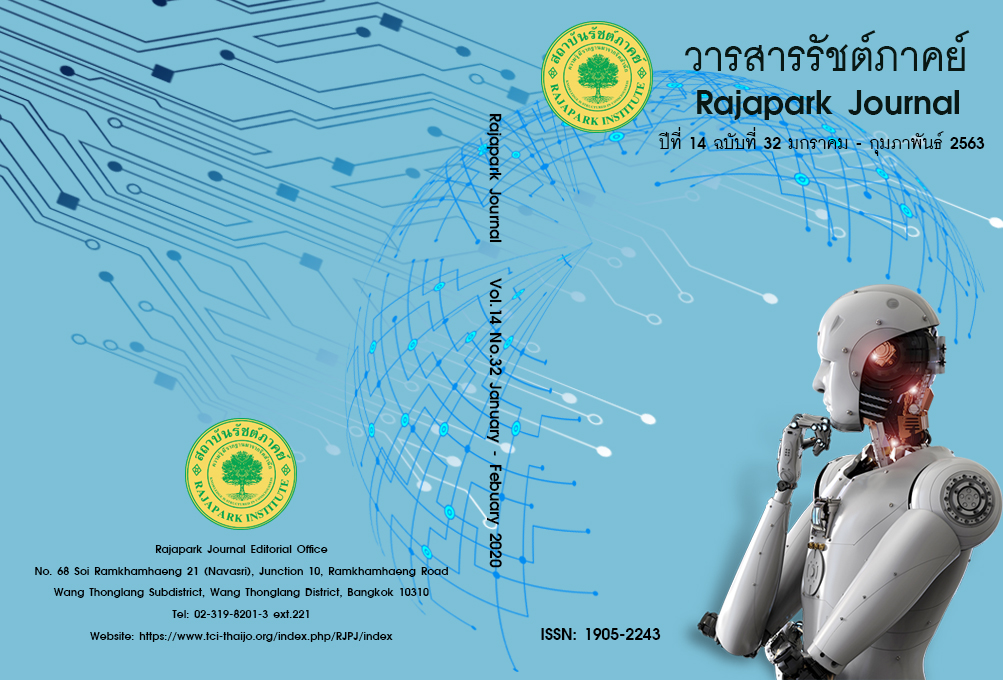Lessons Learned from A Strengthened Community Based on Sufficiency Economy Philosophy: A Case Study of Baan MunKong Suan Plu Community
Main Article Content
Abstract
The study on lessons learned from a strengthened community based on Sufficiency Economy Philosophy: A Case Study of Baan Munkong Suan Plu Community had an objective to study the operations based on the Philosophy at a successful community of Baan Munkong Suan Plu. Data were collected by interviews 2 key informant and 14 community member as suggestion by the key informant and observations and then descriptively and explanatorily reported. The results showed that the successes of the Sufficiency Economy Philosophy at Baan Munkong Suan Plu Community consisted of as follows: 1) There was a strong leader who was able to successfully manage and operate the community based on the Sufficiency Economy Philosophy. 2) External agencies took part in promoting and supporting the operations. 3) Good and clear knowledge and understanding of the Philosophy resulted in that the villagers had clear guidelines, were in the same direction and formed the groups to solve the community social, economic and environmental problems. 4) The important roles of young people and new generations in the community who were cultivated to participate in the Sufficiency Economy activities and to prepare for the succession of the sustainable operations of the Sufficiency Economy Philosophy.
Article Details
Views and opinions appearing in the Journal it is the responsibility of the author of the article, and does not constitute the view and responsibility of the editorial team.
References
Jiwju, N. et al. (2015). Reproducing Effective Lesson on Sufficiency Economy for Developing Wangnumdaeng
Community, Moo 5, Thamkeua Sub-district, Klongklung District, Kamphaengphet Province. The 2nd
Kamphaeng Phet Rajabhat University National Conference. 210-227.
Kittichungchit, M. (2012). The Philosophy of Sufficiency Economy: a Balanced Way of Life. Bangkok: Saengjan
Printing House.
Office of the National Economic and Social Development Council. (2017). The Twelfth National Economic and
Social Development Plan (2017-2021). n.p., p.4
Phetchana, S. (2015). Self-Management Strategies of Baan Munkong Suan Plu Community, Sathorn, Bangkok.
Faculty of Social Administation, Thammasat University.
Polsri, S. (2007). Learning Network in Community Development. Bangkok: Odean Store.
Polsri, S. (2013). Developing the ability of individuals and groups. Bangkok: Odean Store.
Sritong, N. (2013). Concepts, Principles and Practices of Sufficiency Economy Philosophy. Bangkok: O.S. Printing
House.
Sungrugsa, N. & Unaromlert, T. (2010). Good Effects from Application of Sufficiency Economic Philosophy in the
Learning Process and Knowledge Management for Sustainable Development of Community Enterprise:
Case Study of Ratchaburi Province. Faculty of Education, Silpakorn University.
Subcommittee on Sufficiency Economy Implementation. (2006). Questions and Answers on Sufficiency Economy
Philosophy. (4th ed.). n.p.
Tantivejkul, S. (2011). “Basic Concepts of Sufficiency in the Royal Initiative Projects (Graciously by His Majesty
the King Rama IX, the Late)” cited by Thonhpakdee, N., & Silpsuwan, S. (editors). Sufficiency Economy
Philosophy and Thai Society. Bangkok: Research Center of Sufficiency Economy, National Institute of
Development Administration.
The Chaipattana Foundation. (n.d.). Sufficiency Economy Philosophy and New Theory. n.p.: The Chaipattana
Foundation.
Thepsithar, S. (2007). Sufficiency Economy as a Way of Life, Community and Philosophy of Sufficiency
Economy in the Context of Religion and Culture. Bangkok: Somchai Printing House.


